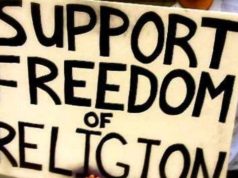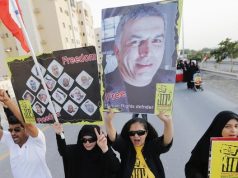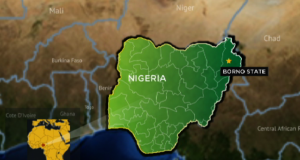The Saudi-Iranian rivalry continues to produce sectarian overtones in countries including Malaysia, Indonesia, Syria, Iraq, Yemen, and Bahrain. State promotion of Sufism, as a counter to Wahhabism, long supported an environment of religious tolerance in Morocco. Yet, in March 2015, Moroccan Salafists gathered in Safi, in southern Morocco, to speak on the dangers of Shiism.[1]
In 2014, Al Jazeera released a classified report by South African Intelligence (NIA) that outlined Iranian efforts “to export the Iranian revolution principles and stir up Shia Muslim groups in several African countries, including Morocco, through the use of a variety of organizations that are concerned with realizing Iranian objectives on the continent.”[2] Since its release, anti-Shiism in Morocco has intensified. In early 2015, Moroccan Salafist groups leveled heavy criticism on Al-Khat al-Rissali for Studies and Publishing, a Shia group present in Tangiers. Al-Khat al-Rissali for Studies and Publishing released a communique, stating the group had not requested authorization in Tangiers. The group is licensed in Fez, the third largest city in Morocco after Casablanca and Rabat. Essam Hassani, a member of Al-Khat al-Rissali, states, “[It is] necessary for the public and observers in the country to distinguish between the legitimacy of the institution from a legal point of view, and the legitimacy of public assembly.”[3]
In March 2015, Salafist preacher Mohamed Maghraoui addressed a gathering in Safi, speaking on the dangers of Shiism. This followed an earlier address by Abdellah Nahari, a Moroccan scholar, who warned young Moroccans against the Shia threat on Iranian television. Morocco World News also cited a source who claimed the Unification and Reform Movement, a party close to the ruling Party of Justice and Development, had invited scholars to speak against Shiism in Rabat.[4] Increased Salafist activity lends to the renewed salience of the Saudi-Iranian rivalry on Moroccan soil.
Since the Iranian Revolution in 1979, portions of the Moroccan Shia population have migrated to Iran. The natural friendship of the Saudi and Moroccan monarchies, in its opposition to the growing influences of Nasserism and Iran’s pan-Islamism, facilitated the spread of Wahhabi influence via “preachers, publications, audio cassettes, and generous monetary contributions.”[5] Though Moroccan leadership remained wary of Wahhabism, it contributed to anti-Shia propaganda in the 1970s and 1980s. Morocco advances policies to increase the role of the zawiya, or Sufi lodges, as a counter to Wahhabism. Wahhabism, as an outside influence, has contributed to the rise of political Islam in Morocco.
Such overt anti-Shiism is not new to Morocco. In March 2009, an Iranian official repeated an old claim (also made by the Shah in 1960) that Bahrain was part of Iran. Morocco severed ties with Iran, accusing the latter of promulgating Shiism. Wikileaks alleged that Mohammed VI had, without the knowledge of the Moroccan government, unilaterally ended his country’s relations with Iran at Saudi Arabia’s request.[6] Moroccan local media followed with repeated accusations of Iran’s proselytizing in country. The Moroccan foreign ministry described an attempt “‘to alter the religious fundamentals of the kingdom’ and threaten Morocco’s religious unity.”[7] In May 2009, Moroccan authorities detained approximately 300 people in Tangiers and surrounding towns. In an interview with NPR, Unis Serife, a researcher specializing in religious affairs, states, “Most of the people rounded up denied being Shiites. At most, some had picked up a Shiite book out of curiosity.”[8] As the detainees were quickly released, Serife believes the authorities were trying to get a handle on the size of the Shia population in northern Morocco. Shia leaders were not among those arrested.
In February 2014, Iranian and Moroccan foreign ministers resumed contact. On December 20, 2014, Iran appointed its first ambassador to Morocco in five years, with Morocco expected to follow suit. The Saudi-Iranian rivalry has limited democratic transition in Bahrain, with Saudi forces backing the Khalifa monarchy. While Shia represent a two-thirds majority in Bahrain’s Muslim population, Shia represent less than one percent of the population in Morocco (an estimated 3,000 to 8,000 people). As Salafists accuse Iran of exploiting Morocco’s religious freedom in their promotion of Shiism, Morocco should protect its constitution, which, under Article 3, states “Islam is the religion of the State, which guarantees to all the free exercise of belief.” Morocco should similarly avoid another campaign targeting its small Shia population, which, despite Islamist rhetoric, does not represent a threat to the monarchy.
[1] “Moroccan Islamists warn against ‘Shia threat’ in Morocco,” Morocco World News, March 17, 2015, http://www.addwebsitefree.eu/news_story/5817835/moroccan-islamists-warn-against-shia-threat-in-morocco [accessed March 18, 2015].
[2] ibid, 1.
[3] “Moroccan Shiite Group Denies Receiving Authorization to Open Office in Tangier,” Morocco World News, March 5, 2015, http://www.moroccoworldnews.com/2015/03/153127/moroccan-shiite-group-denies-receiving-authorization-tangier/ [accessed March 18, 2015].
[4] “Moroccan Islamists warn against ‘Shia threat’ in Morocco,” 1.
[5] Marvine Howe, Morocco: The Islamist Awakening and Other Challenges, Oxford: Oxford University Press, 2005.
[6] Sophie Claudet, “Why did Iran, Morocco resume relations?” Al Monitor, January 25, 2015, http://www.al-monitor.com/pulse/originals/2015/01/iran-morocco-diplomacy-economy-sunni-shiite-islam-jihadist.html [acessed March 18, 2015].
[7] Alfred de Montesquiou, “Morocco severs relations with Iran,” Fox News, March 6, 2009, http://www.foxnews.com/printer_friendly_wires/2009Mar06/0,4675,AFMoroccoIran,00.html [accessed March 18, 2015].
[8] Peter Kenyon, “Morocco Campaigns Against Shiite Minority,” NPR, May 18, 2009, http://www.npr.org/templates/story/story.php?storyId=104237288 [accessed March 18, 2015].










